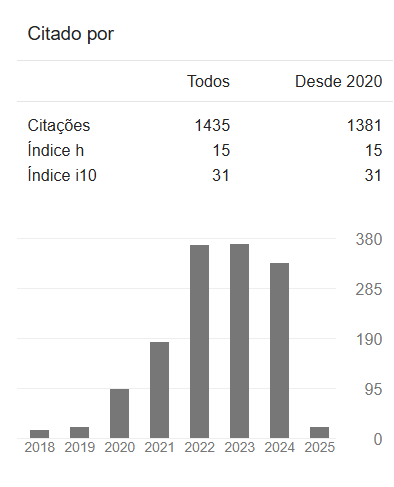STS APPROACH IN THE TRAINING OF CHEMISTRY TECHNICIANS: ANALYSIS IN PEDAGOGICAL PROJECTS OF COURSES IN TWO PUBLIC INSTITUTIONS IN MATO GROSSO
DOI:
10.23926/RPD.2526-2149.2020.v5.n2.p1111-1123.id742Keywords:
Professional education, Scientific literacy, Citizen formationAbstract
The Science, Technology and Society (STS) approach to teaching seeks to make explicit the relations between such elements and constitutes an important strategy for the construction of knowledge together with the formation of citizenship' conscience. This article analyzes aspects this approach in two technical courses in Chemistry, subsequent to the high school of two institutions public services in Mato Grosso state. To this end, an analysis was made of the Pedagogical Course Projects, having as reference the documentary research and elements of the content analysis for the analytical treatment, looking for textual elements allusive to the CTS approach. The interpretation of the texts of the documents, demonstrated that there is no explanation of the CTS approach, with technical training prevailing. However, it is possible to identify in the discourse that is extracted from fragments of the texts, messages that refer to the concern of technical training in contributing to reducing the impacts of the industrial productive sector on environmental and social issues.
Downloads
Metrics
References
AIKENHEAD, Glen. Educación ciencia-tecnología-sociedad (CTS): una buena idea como quiera que se le llame. Educación Química, v. 16, n. 2, p. 304-315, 2005. Disponível em: https://andoni.garritz.com/documentos/aikenhead_a_rose_by_any_other_name.pdf. Acesso em: 21maio 2020. DOI: https://doi.org/10.22201/fq.18708404e.2005.2.66121
AULER, Décio. Novos caminhos para a educação CTS: ampliando a participação. In: SANTOS, Wildson Luiz Pereira dos; AULER, Décio. (orgs). CTS e educação científica: desafios, tendências e resultados de pesquisa. Brasília: Editora UnB, 2011. p. 73-97.
BARDIN, Laurence. Análise de conteúdo. São Paulo: Edições 70, 2011.
BRASIL. Resolução n.º 6, de 20 de setembro de 2012. Diretrizes Curriculares Nacionais para a Educação Profissional Técnica de Nível Médio. Diário Oficial da União, Brasília, 21 set. 2012, Seção 1, p. 22. Disponível em: http://portal.mec.gov.br/index.php?option=com_docman&view=download&alias=11663-rceb006-12-pdf&category_slug=setembro-2012-pdf&Itemid=30192. Acesso em: 21 maio 2020.
BRASIL. Lei n.º 9.394, de 20 de dezembro de 1996. Estabelece as Diretrizes e Bases da Educação Nacional. Diário Oficial da União, Brasília, 23 dez. 1996. Disponível em: http://portal.mec.gov.br/seesp/arquivos/pdf/lei9394_ldbn1.pdf. Acesso em: 02 fev. 2020.
CONTRERAS, José. Autonomia de professores. 2. ed. São Paulo: Cortez, 2012.
FERNANDES, Roseane Freitas; STRIEDER, Roseline Beatriz. Dificuldades enfrentadas por professores na implementação de propostas CTS. In: ENCONTRO NACIONAL DE PESQUISA EM EDUCAÇÃO EM CIÊNCIAS, 11, 2017, Florianópolis. Anais...Florianópolis: UFSC, 2017. p. 1-9. Disponível em: http://www.abrapecnet.org.br/enpec/xi-enpec/anais/resumos/R1953-1.pdf. Acesso em: 19ago.2020.
GIL, Antônio Carlos. Métodos e técnicas de pesquisa social. 6. ed. São Paulo: Atlas, 2008.
LUCKESI, Cipriano Carlos. Filosofia da Educação. São Paulo: Cortez, 1994.
MINAYO, Maria Cecília de Souza. (org.). Pesquisa Social: teoria, método e criatividade. 18. ed. Petrópolis: Vozes, 2001.
MUENCHEN, Cristiane; AULER, Décio. Configurações curriculares mediante o enfoque CTS: desafios a serem enfrentados na educação de Jovens e Adultos. Ciência & Educação, v. 13, n. 3, p. 421-434, 2007. Disponível em: https://www.scielo.br/pdf/ciedu/v13n3/a10v13n3.pdf. Acesso em: 19 ago. 2020. DOI: https://doi.org/10.1590/S1516-73132007000300010
PEDRETTI, Erminia; NAZIR, Joanne. Currents in STSE Education: mapping a complex field, 40 years on. Science Education, v. 95, n. 4, p. 601-626, 2011. DOI: https://doi.org/10.1002/sce.20435
PÉREZ, Leonardo Fabio Martínez. Cuestiones sociocientíficas en la formación de profesores de ciencias: aportes y desafíos. Tecné, Episteme y Didacxis, n. 36, p. 77–94, 2014. Disponível em: https://revistas.pedagogica.edu.co/index.php/TED/article/view/2913/2634. Acesso em: 25 out. 2019. DOI: https://doi.org/10.17227/01213814.36ted77.94
PPC-1. Projeto Pedagógico do Curso Técnico em Química Subsequente ao Nível Médio. Rondonópolis: IFMT, 2016.
PPC-2. Projeto Pedagógico do Curso Técnico em Química. Rondonópolis: SECITECI, 2015.
RICARDO, Elio Carlos. Educação CTSA: obstáculos e possibilidades para sua implementação no contexto escolar. Ciência & Ensino, vol. 1, número especial, nov. 2007. Disponível em: https://edisciplinas.usp.br/pluginfile.php/4146732/mod_resource/content/2/EDUCA%C3%87%C3%83O%20CTSA-OBST%C3%81CULOS.pdf. Acesso em: 19 ago. 2020.
RODRIGUES, José. Qual cidadania, qual democracia, qual educação? Trabalho, Educação e Saúde, v. 4, n. 2, p. 417-430, 2006. Disponível em: https://www.scielo.br/pdf/tes/v4n2/12.pdf. Acesso em: 20 jan. 2020. DOI: https://doi.org/10.1590/S1981-77462006000200012
SAMPIERI, Roberto Hernandez; COLLADO, Carlos Fernández; LUCIO, María del Pillar Baptista. Metolodogia de Pesquisa. 5. ed. Porto Alegre: Penso, 2013.
SANTOS, Wildson Luiz Pereira dos. Contextualização no ensino de ciências por meio de temas CTS em uma perspectiva crítica. Ciência & Ensino, Campinas, v. 1, n. esp., p. 1-12, 2007. Disponível em: http://files.gpecea-usp.webnode.com.br/200000358-0e00c0e7d9/AULA%206-%20TEXTO%2014-%20CONTEXTUALIZACAO%20NO%20ENSINO%20DE%20CIENCIAS%20POR%20MEI.pdf. Acesso em: 02 mar. 2020.
SANTOS, Wildson Luiz Pereira dos. Educação CTS e cidadania: confluências e diferenças. Amazônia: Revista de educação em ciências e matemáticas, v. 9, n. 17, p. 49-62, 2012. Disponível em: https://periodicos.ufpa.br/index.php/revistaamazonia/article/view/1647/2077. Acesso em 19 fev. 2020. DOI: https://doi.org/10.18542/amazrecm.v9i17.1647
STRIEDER, Roseline Beatriz; KAWAMURA, Maria Regina Dubeux. Educação CTS: parâmetros e propósitos brasileiros. Alexandria: Revista de Educação em Ciência e Tecnologia, v. 10, n. 1, p. 27-56, 2017. Disponível em: https://periodicos.ufsc.br/index.php/alexandria/article/view/1982-5153.2017v10n1p27/34216. Acesso em: 02 mar. 2019. DOI: https://doi.org/10.5007/1982-5153.2017v10n1p27
Downloads
Published
How to Cite
Issue
Section
License
Copyright (c) 2023 A Revista Prática Docente tem o direito de primeira publicação

This work is licensed under a Creative Commons Attribution-NonCommercial 4.0 International License.
Authors who publish in this journal agree to the following terms:
- Authors retain the copyright and grant the journal the right of first publication, with the paper simultaneously licensed under the Licença Creative Commons Attribution allows the sharing of the work with acknowledgment of authorship and initial publication in this journal.
- Authors are authorized to take additional contracts separately, for non-exclusive distribution of the version of the work published in this journal (e.g. publish in institutional repository or as a book chapter), with acknowledgment of authorship and initial publication in this journal.











